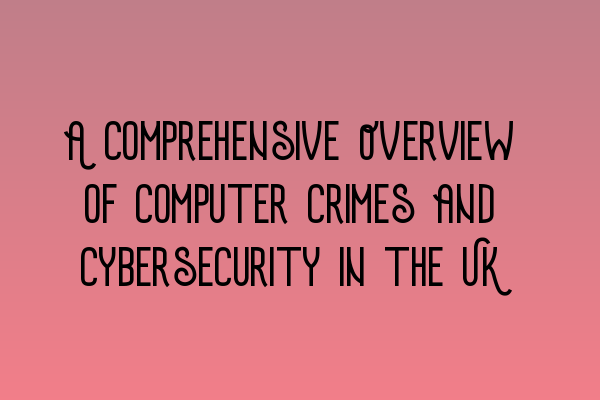A Comprehensive Overview of Computer Crimes and Cybersecurity in the UK
In today’s digital age, computer crimes have become a significant concern for individuals, businesses, and governments alike. The advancement of technology has provided numerous benefits, but it has also opened doors for various cyber threats. Cybersecurity plays a crucial role in protecting sensitive information and preventing unauthorized access to computer systems.
Types of Computer Crimes
Computer crimes can encompass a wide range of illicit activities conducted through the use of computers or the internet. Some common types of computer crimes include:
- Phishing attacks: This involves fraudulent attempts to obtain sensitive information, such as passwords or financial details, by posing as a trustworthy entity.
- Hacking: Unauthorized access to computer systems or networks with the intent to gain information, manipulate data, or disrupt operations.
- Malware: The use of malicious software, such as viruses, worms, or ransomware, to infiltrate systems and cause damage or extract sensitive information.
- Identity theft: The illegal acquisition of someone’s personal information to commit fraud, typically in financial transactions.
- Cyberstalking: The use of technology to harass, threaten, or intimidate someone, often through social media platforms or email.
Legislation and Cybersecurity Measures
The UK has implemented various laws and regulations to combat computer crimes and ensure cybersecurity. The Computer Misuse Act 1990 is the primary legislation that governs computer-related offenses and penalties. It criminalizes unauthorized access, unauthorized acts intending to impair computer operations, and the creation and distribution of malicious software.
Additionally, the General Data Protection Regulation (GDPR) provides a framework for the protection of personal data and imposes heavy fines for data breaches. The Information Commissioner’s Office (ICO) enforces the GDPR and sets guidelines for cybersecurity practices and data protection measures.
Organizations and individuals can take several steps to enhance cybersecurity and protect against computer crimes:
- Regularly update software and operating systems to ensure the latest security patches are applied.
- Use strong, unique passwords and enable two-factor authentication whenever possible.
- Implement firewalls, antivirus software, and intrusion detection systems to monitor and block suspicious activities.
- Educate employees or individuals on cybersecurity best practices, such as recognizing phishing emails and avoiding suspicious websites.
- SQE preparation courses provide comprehensive knowledge on computer crimes and cybersecurity for aspiring lawyers.
The Role of Defense Solicitors in Computer Crime Cases
When individuals or organizations are accused of computer crimes, seeking the expertise of a defense solicitor is crucial. Defense solicitors specializing in criminal law, such as SQE Criminal Law & Practice Law UK can provide legal representation and advice throughout the legal process.
Defense solicitors with expertise in computer crimes can:
- Assist clients in understanding the complex legal framework surrounding computer crimes and cybersecurity.
- Conduct thorough investigations to gather evidence and build a strong defense strategy.
- Negotiate with prosecutors to potentially reduce charges or penalties.
- Defend clients in court, presenting arguments and challenging the evidence presented by the prosecution.
- SQE 2 preparation courses enhance a solicitor’s knowledge and skills in handling computer crime cases.
Conclusion
Computer crimes pose a significant threat in the digital landscape, and cybersecurity measures are crucial for safeguarding sensitive information. Understanding the various types of computer crimes, staying updated with legislation, and seeking assistance from defense solicitors with expertise in computer crime cases can ensure effective protection and legal representation.
For more information on related topics:
